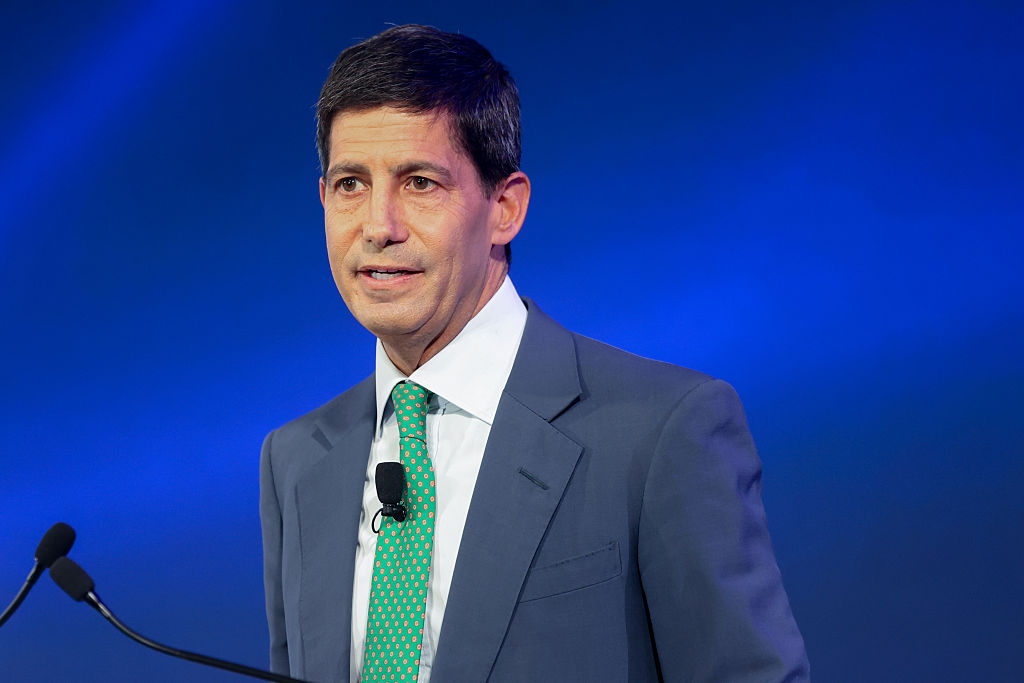CD Rates Are High, Shop Around to Get the Best Returns
High-interest CD rates are back — shop around for the best 5%+ deals.


Profit and prosper with the best of Kiplinger's advice on investing, taxes, retirement, personal finance and much more. Delivered daily. Enter your email in the box and click Sign Me Up.
You are now subscribed
Your newsletter sign-up was successful
Want to add more newsletters?

Delivered daily
Kiplinger Today
Profit and prosper with the best of Kiplinger's advice on investing, taxes, retirement, personal finance and much more delivered daily. Smart money moves start here.

Sent five days a week
Kiplinger A Step Ahead
Get practical help to make better financial decisions in your everyday life, from spending to savings on top deals.

Delivered daily
Kiplinger Closing Bell
Get today's biggest financial and investing headlines delivered to your inbox every day the U.S. stock market is open.

Sent twice a week
Kiplinger Adviser Intel
Financial pros across the country share best practices and fresh tactics to preserve and grow your wealth.

Delivered weekly
Kiplinger Tax Tips
Trim your federal and state tax bills with practical tax-planning and tax-cutting strategies.

Sent twice a week
Kiplinger Retirement Tips
Your twice-a-week guide to planning and enjoying a financially secure and richly rewarding retirement

Sent bimonthly.
Kiplinger Adviser Angle
Insights for advisers, wealth managers and other financial professionals.

Sent twice a week
Kiplinger Investing Weekly
Your twice-a-week roundup of promising stocks, funds, companies and industries you should consider, ones you should avoid, and why.

Sent weekly for six weeks
Kiplinger Invest for Retirement
Your step-by-step six-part series on how to invest for retirement, from devising a successful strategy to exactly which investments to choose.
CD rates benefited from a rising interest rate environment, while the Federal Reserve was raising the fed funds rate between 2022-2023. But as the rate hiking campaign appears to have ended (the Fed held interest rates steady in January, its fourth consecutive pause), the boon to CD rates could be waning soon.
To combat inflation, the Federal Reserve raised interest rates 11 times since March 2022. And as interest rates kept rising, so did rates on high-yield savings accounts and CDs.
As was expected, the Federal Reserve held interest rates steady for the fourth consecutive time at its January policy-setting meeting. This pause in rate hikes means the fed funds rate will remain at a target range of 5.25% to 5.5%. In December, the Federal Reserve saw three interest rate cuts in 2024, and lowered its median interest-rate projection for the end of 2024 to 4.6%.
However, the Fed's latest statement pushed back on expectations that rate cuts will begin in March. In the official statement, the Federal Reserve states: "The Committee does not expect it will be appropriate to reduce the target range until it has gained greater confidence that inflation is moving sustainably toward 2 percent."
According to LendingTree Senior Economist Jacob Channel, "The Fed is being very cautious as it navigates the potential for future rate cuts. While it doesn't want to leave rates high forever, it also doesn't want to cut them prematurely and risk inflation spiking again. Owing to this, we're likely going to see the Fed hold rates steady for a few more months while they wait to get an even clearer picture of how the economy is doing and where it's likely to be headed. The more we see inflation growth continue to cool, the more comfortable the Fed will be with cutting rates."
Following the Federal Reserve’s decision to hold rates steady, rates on CD accounts have started to fall. And if the Federal Reserve does indeed cut interest rates later this spring, savings rates will likely drop even further. For this reason, lock in CD rates while they're still high.
Many CDS still offer high rates
If you research your options and shop around, you'll find that many CDs are still offering APY rates of over 5%. Often, in order to get the top rates on CDs you'll need to forgo your brick-and-mortar bank and instead opt for an online "challenger" bank. And sometimes, but not always, you may need a higher deposit ($1,000 minimum) to access these best CD rates.
Check out our tool — in partnership with Bankrate — which lets you search for the best CD rates available now.
What is a CD?
A certificate of deposit, or CD, is a type of savings account that holds a fixed amount of money for a fixed period of time. Interest rates on CDs are typically higher than they are for regular savings accounts, and the rate that you sign up for stays the same rate for the whole term. Meaning, if rates drop for new CDs, you’ll still keep your rate. Keep in mind that if you decide to withdraw before the term is up, you’ll be stuck with pretty hefty exit fees that can offset any interest you've already earned.
CDs are good options when saving for a specific goal, but they're not great for savings that you’ll need immediate access to — so it's best to avoid putting your emergency fund in a CD. Typical term lengths for CDs range anywhere from three months to five years.
Determining what CD term you should plump for is easier if the money is going towards a particular savings goal. For example, if you plan on getting married in three years, then opening a 3-year CD makes sense.
However, you may be looking to open a CD with no particular savings goal in mind, so you’ll have to decide whether to get a short-term or long-term CD. To do so, you should consider interest rates, early withdrawal penalties and the amount of time you’re willing to commit. Typically, longer-term CDs have higher interest rates than short-term CDs, but you’ll have to wait longer to access those funds or risk incurring a fee.
Why open a CD
CDs are a great option if you’re looking for a guaranteed rate of return on your savings. They’re geared toward earning interest on money that’s already been saved, often for a future purchase, like a down payment on a vehicle or home. With a CD, you’re making an up-front payment, rather than contributing monthly, so it's not a useful tool for those looking to save gradually. Therefore, if you’re planning to make continuous deposits into a savings account, a traditional or high yield savings account would be a better option for you.
Pros of CDs
- Safe, no-risk, investments
- There's a guaranteed rate of return
- Offer higher interest rates on deposits than traditional savings accounts
- Usually have no monthly fees
Cons of CDs
- Money cannot be easily accessed, without facing early withdrawal penalties.
- You’ll pay taxes on interest accumulated in the CD.
- Fixed interest rates on CDs mean that if rates rise, you won’t be able to take advantage of these higher interest rates.
- Lower returns than if investing in stocks or mutual funds (but always remember the value of your investment can go down as well as up).
Some of the best CD rates available now
Andrews Federal Credit Union
APY: 5.75% (Limited-time only)
Minimum deposit: $1,000
Term: 6 months
Total Direct Bank
APY: 5.51% / 5.50%
Minimum deposit: $25,000
Term: 3 months / 12 months
Newtek Bank
APY: 5.55%
Minimum deposit: $2,500
Term: 6 months
BMO Alto
APY: 5.50%
Minimum deposit: $0
Term: 6 months
USAlliance Financial
APY: 5.40%
Minimum Deposit: $500
Term: 12 months
Bask Bank
APY: 5.40%
Minimum Deposit: $1,000
Term: 12 months
Pelican State Credit Union
APY: 5.27%
Minimum Deposit: $500
Term: 24 months
Transportation Federal Credit Union
APY: 5.00%
Minimum Balance: $1,000
Term: 36 months
Credit Human
APY: 4.60%
Minimum Balance: $500
Term: 48 months
First Internet Bank
APY: 4.61%
Minimum Balance: $1,000
Term: 60 months
Related content
Profit and prosper with the best of Kiplinger's advice on investing, taxes, retirement, personal finance and much more. Delivered daily. Enter your email in the box and click Sign Me Up.

Erin pairs personal experience with research and is passionate about sharing personal finance advice with others. Previously, she was a freelancer focusing on the credit card side of finance, but has branched out since then to cover other aspects of personal finance. Erin is well-versed in traditional media with reporting, interviewing and research, as well as using graphic design and video and audio storytelling to share with her readers.
-
 Quiz: Do You Know How to Avoid the "Medigap Trap?"
Quiz: Do You Know How to Avoid the "Medigap Trap?"Quiz Test your basic knowledge of the "Medigap Trap" in our quick quiz.
-
 5 Top Tax-Efficient Mutual Funds for Smarter Investing
5 Top Tax-Efficient Mutual Funds for Smarter InvestingMutual funds are many things, but "tax-friendly" usually isn't one of them. These are the exceptions.
-
 AI Sparks Existential Crisis for Software Stocks
AI Sparks Existential Crisis for Software StocksThe Kiplinger Letter Fears that SaaS subscription software could be rendered obsolete by artificial intelligence make investors jittery.
-
 My Spouse and I Are Saving Money for a Down Payment on a House. Which Savings Account is the Best Way to Reach Our Goal?
My Spouse and I Are Saving Money for a Down Payment on a House. Which Savings Account is the Best Way to Reach Our Goal?Learn how timing matters when it comes to choosing the right account.
-
 How to Budget as a Couple Without Fighting About Money
How to Budget as a Couple Without Fighting About MoneyThese tips will help you get on the same page to achieve your financial goals, with minimal drama.
-
 3 Reasons to Use a 5-Year CD As You Approach Retirement
3 Reasons to Use a 5-Year CD As You Approach RetirementA five-year CD can help you reach other milestones as you approach retirement.
-
 4 Psychological Tricks to Save More in 2026
4 Psychological Tricks to Save More in 2026Psychology and money are linked. Learn how you can use this to help you save more throughout 2026.
-
 Trump Nominates Kevin Warsh to Fed Chair. How Will This Impact Savers?
Trump Nominates Kevin Warsh to Fed Chair. How Will This Impact Savers?Here's a look at how Warsh could influence future Fed policy if he's confirmed.
-
 Why Your Bank Suddenly Lowered Your APY — And What to Do Next
Why Your Bank Suddenly Lowered Your APY — And What to Do NextWhy banks lower APYs, options you can explore when it happens and whether more rate cuts are on the horizon.
-
 Do You Have a CD Maturing Soon? Here's What to Do Next
Do You Have a CD Maturing Soon? Here's What to Do NextThese strategies of what to do when you have a CD maturing soon will have you maximizing returns even with rate cuts.
-
 How to Open and Maintain an Online Savings Account Safely
How to Open and Maintain an Online Savings Account SafelyOnline banks offer generous APYs that most brick-and-mortar banks can't match. If you want to make the switch to online but have been hesitant, I'll show you how to do it safely.